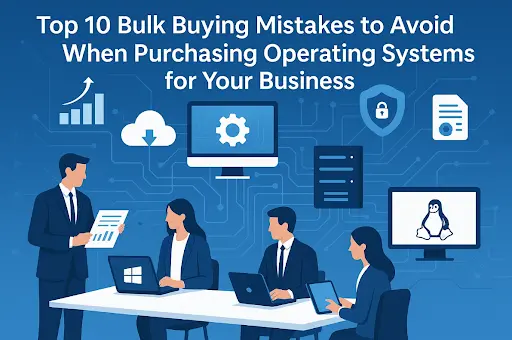
-
Posted By Sarmad Ahmad
-
-
Comments 0
Every business relies on efficient operating systems to ensure its operations run smoothly. For a reliable system, it is important to choose one that serves as a long-term investment in terms of production, scalability, plus security.
However, when it comes to purchasing a business operating system, many organizations fail to consider aspects that may lead to wasted costs, compatibility problems, and industry risks.
It is, therefore, essential to plan strategically and avoid bulk purchasing mistakes in the long run.
By doing so, businesses can make smarter decisions for their organizational requirements.
This blog covers the top 10 bulk buying mistakes to avoid when making a purchase, along with tips on what to consider for your setup.
Table of Contents
ToggleTop 10 Mistakes in Bulk Buying You Must Avoid
1. Ignoring Business Requirements
A mistake that businesses make when considering an y is looking past their actual requirements. Every enterprise works differently, with its own hardware system and security standards.
It is therefore important to choose a system that is not only cheap or really popular, but one that works efficiently and prevents long-term costs.
What to Prioritize Instead for Businesses
- Match OS features to your industry requirements, such as finance, healthcare, and retail.
- Assess workflow requirements, like remote access, virtual collaboration software, and mobile integration.
- Consider business standards before bulk buying.
2. Underestimating Expansion Needs
When companies apply for a software purchase, they usually focus on what is readily available. Yet, it should be noted that an operating setup should be scalable.
Systems that fail to adapt to next-gen technological updates may need more expensive upgrades.
Aspects to Consider for Scalability
- Multi-device compatibility makes sure that the system works across several types of devices.
- Cloud computing integration ensures scalability and simpler data sharing as your business grows.
- Regular updates that improve features over time
3. Not Evaluating Licensing Models
Software licensing is crucial when it comes to long-term price efficiency. Several businesses mistakenly choose the wrong licensing plan.
Either businesses pay for more than what is needed, or are insufficiently licensed.
How to Choose the Correct Plan
- Check whether you prefer monthly installments under subscription or a one-time payment plan, for lifetime use.
- Seek enterprise discounts plus bulk licensing deals.
- Review renewal terms and penalties beforehand to avoid cost mishaps and disruption later on.
4. Avoiding Compatibility
Businesses need to check whether their current hardware and applications work with new business software, which they usually forget. Such a mistake results in disruption, extra costs, and wasted hours.
Things to Prioritize for System Compatibility.
- Look out for the minimum hardware requirements before installing.
- Ensure that applications are compatible with business IT solutions
- Examine integrations with third-party software, which are used daily
5. Overlooking Cyber Threats
Cybersecurity is not always prominent in every system. Many businesses find budget more important than protection, which results in cyber threats.
What to Consider for Business Security
- Built-in encryption and firewall protection to secure sensitive enterprise data against cyberattacks.
- Regular security updates from the vendor lead to addressing problems swiftly and reducing risks.
- Meeting industry data security rules
6. Overestimating Usability
The working system should be user-friendly. If not, employees may find it difficult to navigate. It is crucial to evaluate the software purchase for training needs and user experience.
How to Ensure a Better User Experience
- Opt for a friendly and intuitive user interface that is easy to learn.
- Multi-language support makes sure that the system is simple to understand for global teams.
- The system should be accessible to differently abled employees.
7. Failing to Train Employees
Many enterprises think that employees will automatically adapt to a new OS. However, proper training is needed, despite having the best enterprise software.
Without adequate training, there may be confusion and, hence, a loss in productivity.
How to train staff instead
- Go for on-the-job training, and back it with continuous support.
- Use a Step-by-step user manual for employees to understand how to run business applications.
- Give access to dedicated IT support and knowledge transfer, so that the staff is equipped with the skills to run an operating configuration.
8. Leaving Out Vendor Support
When companies buy an operating system, they don’t evaluate vendor support. It is necessary to consider customer service, as well as timely updates in case of emergencies.
What to assess in terms of Vendor Support
- Check if full-day technical support is available.
- Ensure there is access to a self-service portal.
- Clear SLAs and making sure of response times.
9. Not Testing Before Full Usage
At times, businesses purchase bulk licenses without testing the system in real scenarios. It is important to test the item before fully deploying it.
How to ensure complete deployment
- Pilot test with a smaller team to check if your system works efficiently.
- Monitor performance under real-world taskloads.
- Compile user feedback before opting for full-scale usage.
10. Favoring Price Over Value
Businesses often tend to focus on the cheapest systems for business operations. Choosing the correct operating configuration, regardless of budget, results in a good investment in the years to come.
What Businesses should be looking for
- ROI that works longer than short-term savings
- Vendor reputation and dependability in business scenarios
- The setup should have features that align with future compatibility.
Conclusion
In deciding where to buy operating system solutions for your business, avoid rushing into bulk buying without planning in a careful manner. Avoid the top 10 mistakes mentioned above to protect your budget, minimise risks, and guarantee long-term future proofing.
Invest in aspects such as enterprise needs, vendor support, and security before opting for an investment.
Opting for an efficient operating system helps your organization run seamlessly, without any configuration problems.





